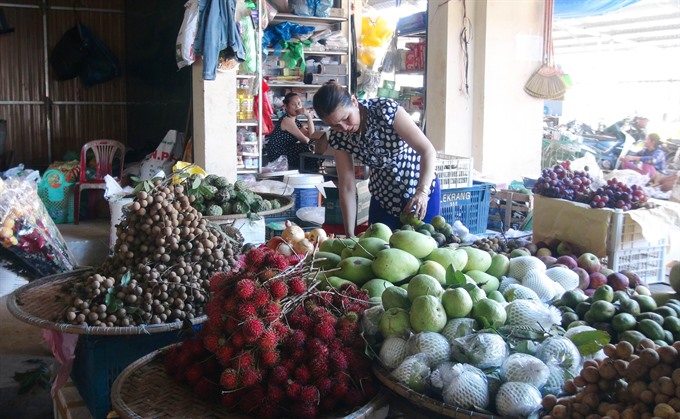

An unhealthy diet is one of the major risk factors for a range of non-communicable diseases (NCDs) including cardiovascular diseases, cancer and diabetes, a workshop heard in Hà Nội on Monday.
 |
| A resident in the central province of Quảng Trị shops for fruit at Nam Đông Market in Gio Linh District where vendors are committed to selling safe food. The food environment and behaviour of food choices in Việt Nam need to be improved in order to control non-communicable diseases related to diet, experts have said. — VNA/VNS Photo Thanh Thủy |
HÀ NỘI — An unhealthy diet is one of the major risk factors for a range of non-communicable diseases (NCDs) including cardiovascular diseases, cancer and diabetes, a workshop heard in Hà Nội on Monday.
According to the Global Burden of Disease Study, which focused on 2017, almost 20 per cent of deaths worldwide were attributable to an unhealthy diet.
About 15 million people died prematurely from NCDs in 2015, an increase of nearly 3.8 million compared with 2000, the study said.
The burden continues to rise disproportionately in low-income and lower-middle-income countries, particularly among younger age groups, while they also face a number of communicable diseases such as HIV/AIDS, tuberculosis and malaria.
However, in these countries, the implementation of studies related to non-communicable disease is very limited. So far, most of the evidence is based on studies from high-income countries.
According to Professor Đặng Đức Anh, director of the National Institute of Hygiene and Epidemiology, with the rapid development of the economy and urbanisation, the food environment and eating habits are changing inappropriately.
"It is time to think seriously and act quickly to improve the food environment and behaviour of food choices in order to control NCDs related to diet," he said at the three-day international workshop titled "Tackling diet related non-communicable diseases in Asia: A regional approach to improve response capacities."
It is estimated that up to eight out of 10 deaths in Việt Nam are from non-communicable diseases.
About 12 million Vietnamese people suffer from hypertension. Nearly 60 per cent have not been diagnosed and over 80 per cent have not been treated, according to a survey conducted by the Ministry of Health.
Hypertension is the leading cause of strokes and heart attacks that cause hundreds of thousands of deaths and disabilities every year.
More than three million people are living with diabetes but nearly 70 per cent have not been diagnosed.
The ministry’s survey in 2015 revealed that more than 50 per cent of adults did not eat enough vegetables or fruit.
People ate more than twice as much salt than is recommended by the World Health Organisation (WHO). The rate of obesity was also increasing rapidly.
"Proper nutrition and healthy food are a top priority in preventing non-communicable diseases and improving people’s health," Deputy Minister of Health Nguyễn Trường Sơn said.
Việt Nam was focusing on preventive measures for the early detection and treatment of diseases, he said.
The workshop serves as a forum for exchanging experiences on improving the food environment through the study, intervention and impact of each country’s policy.
In addition, participants will work together to develop and complete multinational research proposals to improve the food environment.
The workshop, orgainised by the National Institute of Hygiene and Epidemiology, has drawn the participation of healthcare experts and policymakers from China, Mongolia, Sri Lanka, India, Bangladesh, Nepal, Indonesia, the Philippines, Thailand, Malaysia, Laos and Việt Nam. — VNS









